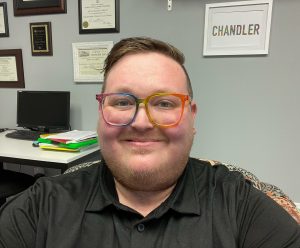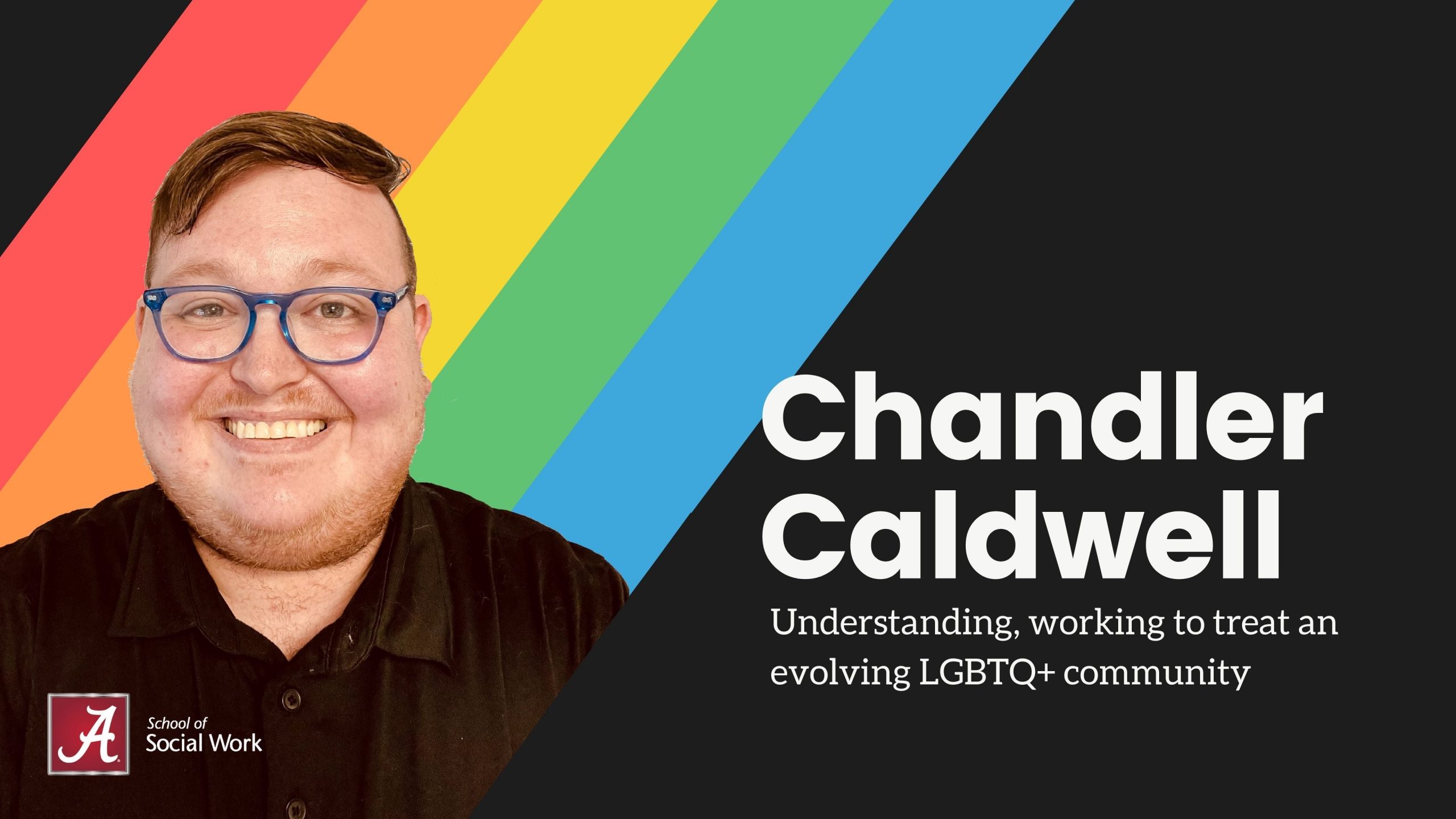By David Miller
June 24, 2021
As an openly gay man in the Deep South, Chandler Caldwell has met many of the same barriers and struggles as others in the LGBTQ+ community. But for all the empathy one can share, he’s learned that the hardships experienced by his community today are both similar and different than when he was growing up.
The advent of social media, round-the-clock news and modern politics have drastically changed “the way we experience being members of the LGBTQ+ community,” he says. These changes and subsequent challenges are reflected in clinical social work settings.
Caldwell, entering his third year in the DSW program, has worked in a variety of psychotherapy and crisis intervention settings, where his clients have ranged from ages 5 to 80. LGBTQ+ identity, especially those who identify as transgender, has become increasingly common among that entire age spectrum, from children who yearn acceptance and are threatening self-harm, to seniors who are transitioning because “now is the only option they’ve had.”
(Related) PRIDE Month: Goodwin Bringing Religious Trauma for LGBTQ+ Community into Focus
Caldwell, through an outpatient mental health setting, has also treated teens and young adults who are either thinking about coming out as members of the LGBTQ+ community, have recently done so, or who are/have transitioned to the gender they most identify with. These clients most often struggle with family rejection, bullying, low self-esteem, and self-loathing, Caldwell said.
His last six years of clinical work have afforded him increased awareness and perspective that both “members of the LGBTQ+ community and those who aren’t should have.”
“I thought I understood the experiences of the LGBTQ community, even those who are transgender,” Caldwell said. “But what I’ve learned is that each person has a unique story and we must understand that our roles as social workers is to understand those experiences, especially those who identify as LGBTQ+ and are members of other vulnerable groups.”
The ‘hardest job I’ve had’
Caldwell earned his MSW from the University of Alabama School of Social Work in 2015 and soon began working in crisis intervention with youth in Tennessee. Many of his clients there were LGBTQ+ and were battling depression, participating in self-harm behaviors, or had become suicidal or homicidal.

Chandler Caldwell plans to continue working in psychotherapy upon completing his DSW.
Caldwell was on-call for 24 hours at a time. He would meet with children and their families at homes, schools, and hospitals.
“Wherever they needed me to be,” Caldwell said. “I covered 15 counties. It was an eye-opening experience.”
Caldwell’s job was critically important, but complicated. And, too often, his role in the chain of care left him “at the surface level.”
“My job was to de-escalate the situation and make recommendations on what needed to happen next,” Caldwell said. “Did [the client] need outpatient treatment? Were they OK to stay home? Did they need to go to a hospital … maybe stay in a hospital? What was the next level of care? The hard thing was not being able to address those deep-rooted problems.
“I had kids tell me they wanted to kill themselves because ‘my parents don’t love me.’ It was very heartbreaking to not be able to follow up with them or know the long-term outcomes.”
Caldwell said through his work and research, acceptance at home is a significant hurdle for LGBTQ+ children to navigate, even if they find acceptance in social circles at school or in other areas of their life.
“If you go home and feel hated, disgusting and unlovable, it’s going to build these core beliefs we have about ourselves, and that will taint everything we look at,” Caldwell said.
Decreasing suicidality
The bonds between LGBTQ+ children and their parents can help prevent suicides among youths, Caldwell says.
He analyzed data about youth who experienced suicidality , including a study by The Trevor Project, for a research paper for Dr. M. Daniel Bennett, Jr.’s “advanced theories on racism and oppression” class.
“What we’re seeing is the bond that a caregiver or parent has with their child can be a protective factor or risk factor,” Caldwell said. “So those youth who have really strong relationships are less likely to attempt suicide. Those who have poor or less strong relationships with those same figures are more likely to attempt suicide. That shows in practice, too.”
Additionally, bullying remains a major risk factor. Despite increased awareness and efforts to prevent bullying in schools, Caldwell also found a gap in supports and programs at the federal level to address bullying for LGBTQ+ youth.
“Most of the positive things that are coming out and helping these faults are at the local level, and they’re coming out of ‘blue’ states,” Caldwell said. “There’s not a whole lot of states that have statewide initiatives to help this population; it’s more school-district wide, very local, and sometimes, school by school.”
Another familiar community
Caldwell’s desire to connect research with practice is being fulfilled in the DSW program, an aspect of social work that’s currently “lacking in the field.”
And he’s happy to pursue his degree at the School of Social Work, where he first connected with two of his cherished career mentors: Nancy Payne, instructor in the School, and retired instructor Joanne Terrell. Caldwell said Terrell taught him “how to be a good therapist and do things ethically.”
“And Nancy is just an amazing person and social worker,” Caldwell said. “I’ve been able to talk to her a lot about diversity, discrimination, and issues we tend to see in the news. She’s been a great person to get guidance from, as far as cultural competence and how to best do that.”
Upon completing his DSW, Caldwell hopes to continue working in psychotherapy, hopes to teach more as an adjunct instructor as he has done since 2018, and potentially transition into academia where he can continue action-based research to help communities in need. Additionally, he hopes to collaborate with local LGBTQ+ health organizations to integrate mental health into their care plans and to increase access to treatment.
